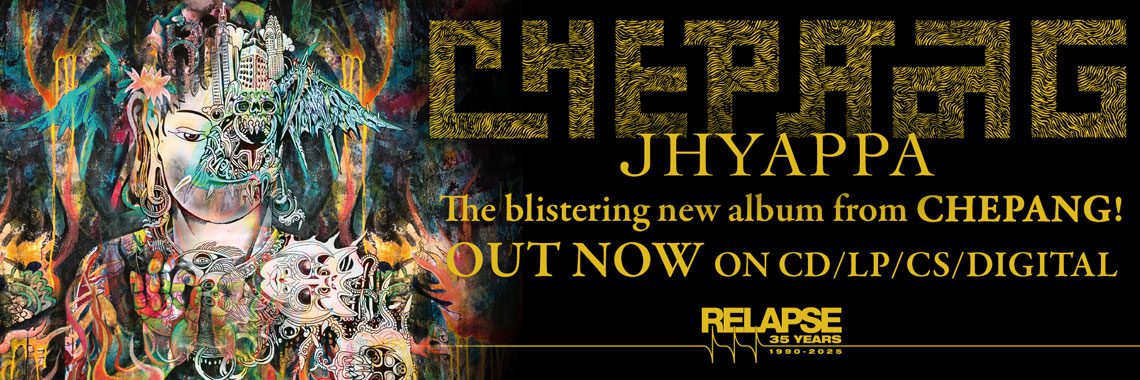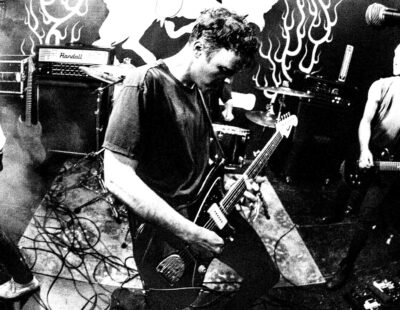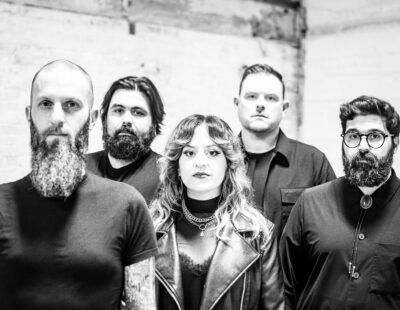** Dødheimsgard’s new album, A Umbra Omega, is no joke (see mental strongman Vicotnik’s argument at the very bottom). It’s a vicious mind-warp of an album, aggressive in its obtuseness and adventurous in its boundlessness. It’s at once black metal (free think!) and not at all (non-conformist!). A Umbra Omega riffs on, then destroys said riffs on, previous albums 666 International and Supervillain Outcast. This is Dødheimsgard. Extra-dimensional black from the deepest, darkest pits of space and time. A Umbra Omega is ritualistic in its abrasiveness, religious in the outcome of surviving its completeness.
From 666 International forward, Dødheimsgard has imbibed in the weird, the strange, and the obtuse. I figured you would’ve tried to pull the opposite of what you’re known for on A Umbra Omega. Maybe that’s too predictable too. So, you opted to stay weird. Was that kind of the idea?
Vicotnik: It was no specific idea as such, but since I love music, it is natural for me to get inspired by other genres as well. There was really never any moment in my life, where I only listened to black metal. I am also product from that school of reasoning that was very much present in the early ‘90s scene, that plagiarism is the biggest sin of them all. So if you look at 95% of the bands from my era, they all (for good or for worse) evolved in some shape or form. The black metal sound of the ‘90s was in itself a little piece of sonic evolution, since early black metal records of the ‘90s did not really have any specific counterparts from the ‘80s. In addition, you had the x-factor in the ‘90s, because nobody knew what they were doing, and the engineers that were set to produce these records had no knowledge of how a record like this was supposed to sound like. I like the idea of pursuing the unknown factor, that sets the table for creativity. There are viable reasons for bands to produce their record over and over again. They may be based on some sort of ideal, or success-recipe. Inadvertently this also means that these bands, to some degree, have to abandon the creative process. Musically one could say that the main focus of this album is the feeling/atmosphere, while the tools rendered to achieve that sought after atmosphere varied through different creative approaches.
What is A Umbra Omega, anyway? The major shadow. The overwhelming darkness?
Vicotnik: The overwhelming darkness is a good and fitting translation. A translation that correlates very much with the intended meaning of the title and the lyrical content on the album. My personal take on it was more like: “From the perfect darkness,” but then I have interpreted even more freely than you have. Grammatically the title will be questionable at best regardless, but the function of the title is not to be flawless in that regard. The darkness pointed to, is a mental darkness, therefore the title also needed some abstractions. Another thing is that to some extent, the reader can draw his or her own interpretations of it, even though the words making up the whole are few.
The album cover looks like something Kent or Mew might come up with. Where were your heads when conceiving the album art?
Vicotnik: [Laughs] OK, no never had those bands in mind. I just wanted something clean to contrast to the complexity of the musical content itself. I also wanted album art that was kind of void of opinions, since the lyrical content is an introverted inspection. The atmosphere of the cover helps putting the content on the album in the right mental framing.
Would you say Dødheimsgard is black metal at this stage? Or evolved into blacker metal?
Vicotnik: What is your opinion? [beyond-black metal—CD] For some, this album will have exactly what they consider the essentials of what black metal should be. Others will feel it lacks the very same thing. Opinionated discussion are OK, but they can only go so far. I have given two—thirds of my life to black metal, so in my analysis of our work, this is black metal because of the foundation of the record being rooted in black metal. Given, half of the album is not even metal, but that means that it’s really the “metal” in “black metal” that does not belong. But that makes no sense either. In the end, I have no desire to call this album by any other term than black metal, and it suits me fine that people have a different opinion. Is not that we are here for? To stir the pot a bit.
Back in 2013, you posted about jail time, forced therapy, drugs, and a whole bunch of uncomfortable stuff. Was that the fuel that brought A Umbra Omega to life?
Vicotnik: Yes, but have in mind that the post is written with a certain glint in the eye, so where the reality stops and the fiction begins is not easy to discern. “A Umbra Omega” is a 20 year retrospection. The specifics of the themes are removed from the context, but the thoughts, ideas, concepts and notions are not.
What brought Aldrahn back into the fold? Certainly it wasn’t the therapy.
Vicotnik: Just right time and place I guess. Practically speaking, the spot was vacant and a new album was on the horizon. I could do the vocals myself, or we could go with the individual that sang on all but one of our records. Simple choice really. Aldrahn connected very strongly to the material from the first listen, which also helps I suppose. On a human level, it’s nice to have the co-founding member and my buddy back in the band. Someone to share the history of the band with and that I know will stay dedicated for a long time. Aldrahn has been a big part of building the house that is DHG, so this was a homecoming for him.
Speaking of old members. Who is in Dødheimsgard and where do they come from? Clearly, not all are from Uranus.
Vicotnik: No, I am from Ganymedes actually, but growing up I spent my holidays on Miranda, I could see Uranus from there. Except Aldrahn and I, there are a new bunch of people. Sekaran has been with us since ‘09, so his been part of the band for a long time. I consider Sekaran a very big and important part of the band. Some people have that ability by through just being the kind of person they are. Sekaran is from the 13th century. Thunberg (guitars) and L.E. Måløy (bass) are the newest asylum inmates. Thunberg is from Hell and Måløy is a hologram.
I’m still trying to digest Supervillain Outcast. How dare you come up with A Umbra Omega so quickly? By the way, what were the writing sessions like?
Vicotnik: Hm, eight years digestion. You should really get your metabolism tested. The writing process for this album was a solitary one. So to take the DHG asylum analogy a bit further, I was in solitary confinement. I think many songwriters know beforehand what their searching for musically on an emotional level, but does not necessarily know how to get there. When I started writing songs for A Umbra, they sounded like Outcast songs. So I kind of have to go from there and try to get closer to the present mental projection I have of DHG. In the end it is very unscientific, when the music eventually gives me the right feeling, then I made it home.
Was there a point where you said, “This isn’t going to go over very well. Let’s tone things down.”?
Vicotnik: No, if something doesn’t go down well, it means you are hitting a nerve somewhere. If you can combine that with musical integrity as well, then there is nothing better. Love us or hates, a music genre that kind of made its mark on being edgy, needs a band like us that still are able to push the musical boundaries.
I have to ask. Is Dødheimsgard fucking with us? Like a very elaborate joke meant to confuse black metal purists and heavy metal kids who don’t understand Sun Ra’s free jazz period?
Vicotnik: Always fucking with your minds.
** Dødheimsgard’s new album, A Umbra Omega, is out now on Peaceville Records. It’s available HERE on CD and VINYL for fuck-ups, progressives, magicians, and occult leaders. And possibly black metallers.







